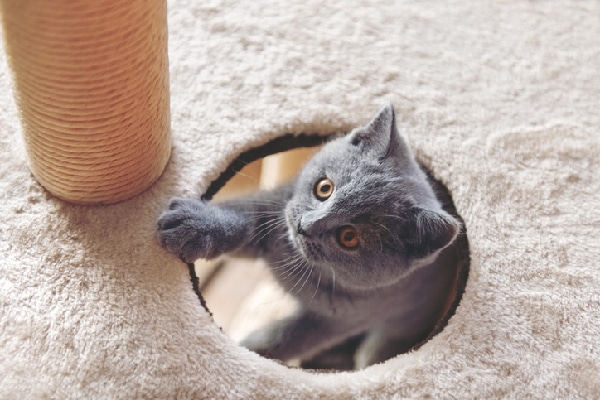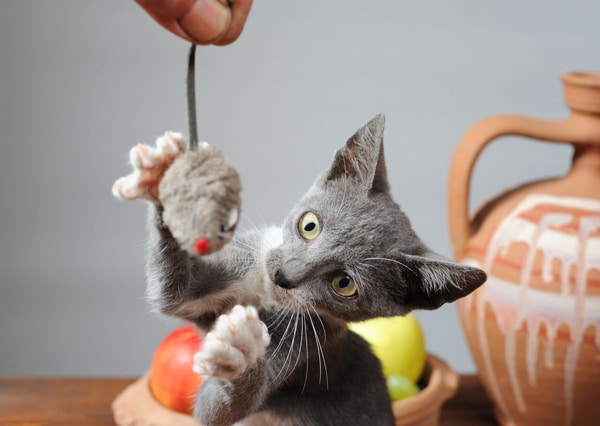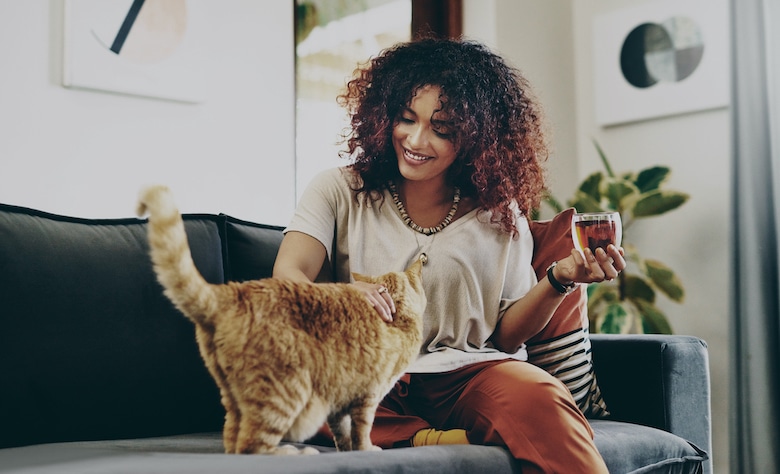Time flies when you have a kitten. And before you know it, that little furball that loved pouncing and rolling all over your living room floor has grown into a sofa lion. Though you love your grown-up cat, you may feel a little sad she grew up so fast. Post-kitten blues are real.
“There’s just nothing cuter than a tiny kitten,” says Dr. Laura Pletz, the scientific services manager at Royal Canin.
But your cat’s next chapter can be just as rewarding.
“So often kittens are exploring and learning what the big, wide world is like,” Dr. Pietz says. “When they really start to mature and settle into their home and relationships with everyone in the house, you start to see personality come out.”
Dr. Pietz shares ways to ditch the post-kitten blues and continue to be your cat’s meow as they grow up.

A cat popping out a cat tree. Photography © lisegagne | iStock / Getty Images Plus.
Build a foundation
The best way to continue to feel good about your bond as your cat gets older is to establish a loving one when they’re young.
“It’s really about socializing them with everyone in the home to begin with,” Dr. Pietz says.
As your cat explores the world, pay close attention to what they respond to. Maybe they could bat at a wand toy forever, or maybe they love to chase a ball around the house. Many cats love to look out the windows and benefit from perches, and others like to climb and would love an environment with a cat tree or three.
“Make sure they have that and lots of space in the environment, so they are really comfortable in the home because that drives the relationship,” Dr. Pietz says. “When they don’t have that environmental enrichment, you may find they are the cat that goes away and hides in a certain area. That is not as positive for the overall relationship.”
Accept your cat
Even if you established a great relationship with your cat, they might change a bit as they grow out of their kitten phase.
“You’ll find all sorts of personalities around cats,” Dr. Pietz says. “Some are lap cats. Some just want to be in the room hanging out.”
Related: What Cats Are Lap Cats?
Remember, people can be like this, too — sometimes we become less playful or cuddly as we age. Dr. Pietz says it’s best to meet your cat where they are rather than trying to force them to be someone they are not.
“A lot of it is about continuing to address their need,” she says. “Those can vary based on the cat. Respect the cat that isn’t a cuddler and just likes to be near you … if you try to force them into your lap, they don’t appreciate it.”
Talk to your cat
Though there aren’t really studies saying it’s good to talk to your cat, Dr. Pietz says it’s still a fun way to connect.
“You love the response you get when you say certain things or their names,” she says.
And if they ignore you? Embrace it and laugh about it, Dr. Pietz says.

Cat playing with a plush mouse by Shutterstock.
Continue playtime
Cats who continue to be playful are sort of like big kittens. If your cat likes to play, encourage that.
“It really is all about continuing to enrich their environment and stimulate their mind,” Dr. Pietz says. “It’s about finding what’s that thing the cat likes to bat around and chase on its own. They’re all a little different.”
Crinkly balls, mice and puzzle toys are popular choices.
Create a cat cave
If you’re the crafty type, consider taking up a home improvement project or two that your cat will love. You can build things like perches and catios that turn your home into a kitty oasis.
“The biggest benefit is it makes them happy and comfortable in the environment,” Dr. Pietz says. “You’re providing them a space so they can get to where they need to be.”
It also may show you that your cat still needs you, even if they’ve become more independent.
Featured photo: Delmaine Donson/Getty Images
Read Next: 5 DIY Projects You and Your Kids Can Make for Your Cats
